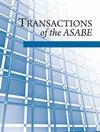内布拉斯加州雪松河河岸稳定结构对上游和下游河岸动员的影响
IF 1.4
4区 农林科学
Q3 AGRICULTURAL ENGINEERING
引用次数: 3
摘要
稳定结构只在稳定段有效。稳定化后,6个断面中有2个断面的侵蚀增加。稳定后6段沉积物均减少。防波堤在减少侵蚀方面是有效的,但也容易损坏。河岸稳定结构的有效性还没有得到充分的量化。虽然这些结构在局部范围内明显减少或消除了河岸侵蚀,但对上游和下游不稳定河段的相关影响知之甚少。这项研究测量了雪松河河段的河岸侵蚀和沉积,从24个稳定结构(包括防波堤、岩石叶片、根丛和砾石保护)的上游和下游测量了1.5个弯曲波长。我们还测量了稳定位置正对面河岸的侵蚀和沉积。我们使用ArcGIS中的历史图像比较了稳定前(1993-2005)和稳定后(2005-2018)的测量结果。在完成这一分析后,我们能够拒绝最初的假设,即稳定后当地和邻近的河滩段的侵蚀率会显著降低,而稳定位置和邻近河段的沉积率会更高。相反,稳定前和稳定后的侵蚀差异很少或没有统计学意义。相反,我们的数据表明,6个河段中只有4个河段的河岸侵蚀减少,并且主要局限于稳定河段。河岸稳定后,所有六个河段的总体沉积量都有所减少。在安装了木制防波堤的水域,部分或全部破坏是常见的,侵蚀的进一步增加和沉积的减少更为明显。我们得出结论,杉树河的河岸稳定只在安装位置有效;对邻近的不稳定河段没有可测量的影响。我们的研究结果表明,需要改进河滩监测实践,并更好地了解河滩稳定如何影响整个河流系统。这些进展将加强河流修复的设计和实施,并支持未来的河流管理工作。关键词:邻近河段;淤积;防波堤;本文章由计算机程序翻译,如有差异,请以英文原文为准。
Impact of Bank Stabilization Structures on Upstream and Downstream Bank Mobilization at Cedar River, Nebraska
HighlightsStabilization structures are only effective at stabilized segments.Erosion increased in two of the six segments in the post-stabilization period.Deposition decreased in all six segments in the post-stabilization period.Jetties are effective at reducing erosion but are also prone to fail.Abstract. The effectiveness of streambank stabilization structures is insufficiently quantified. Although such structures clearly reduce or eliminate streambank erosion at the local scale, little is known about associated effects on unstabilized reaches immediately upstream and downstream. This study measured streambank erosion and deposition in stretches of the Cedar River, 1.5 meander wavelengths upstream and downstream from 24 stabilization structures that included jetties, rock vanes, root wads, and gravel protection. We also measured erosion and deposition on the streambanks directly opposite the stabilized locations. We compared measurements from the pre-stabilization period (1993-2005) with those from the post-stabilization period (2005-2018) using historical imagery in ArcGIS. Upon completion of this analysis, we were able to reject an initial hypothesis that local and adjacent streambank segment erosion rates would be significantly less after stabilization, and that deposition rates would be greater in stabilized locations and adjacent stream segments. Instead, the differences in erosion from pre- to post-stabilization showed little or no statistical significance. Rather, our data indicated that streambank erosion decreased in only four of the six stream segments and was predominantly confined to the stabilized segment. Overall deposition decreased in all six stream segments after bank stabilization. In reaches where wooden jetties were installed, partial or total failure was common, and further increases in erosion and decreases in deposition were more pronounced. We conclude that streambank stabilization on the Cedar River is effective only at the location of installation; there is no measurable effect on adjacent unstabilized reaches. Our results demonstrate the need for improved streambank monitoring practices and better understanding of how streambank stabilization impacts an entire river system. Such advances will enhance stream restoration design and implementation, as well as support future river management efforts. Keywords: Adjacent stream reach, Deposition, Jetty, Erosion, Streambank stabilization.
求助全文
通过发布文献求助,成功后即可免费获取论文全文。
去求助
来源期刊

Transactions of the ASABE
AGRICULTURAL ENGINEERING-
CiteScore
2.30
自引率
0.00%
发文量
0
审稿时长
6 months
期刊介绍:
This peer-reviewed journal publishes research that advances the engineering of agricultural, food, and biological systems. Submissions must include original data, analysis or design, or synthesis of existing information; research information for the improvement of education, design, construction, or manufacturing practice; or significant and convincing evidence that confirms and strengthens the findings of others or that revises ideas or challenges accepted theory.
 求助内容:
求助内容: 应助结果提醒方式:
应助结果提醒方式:


